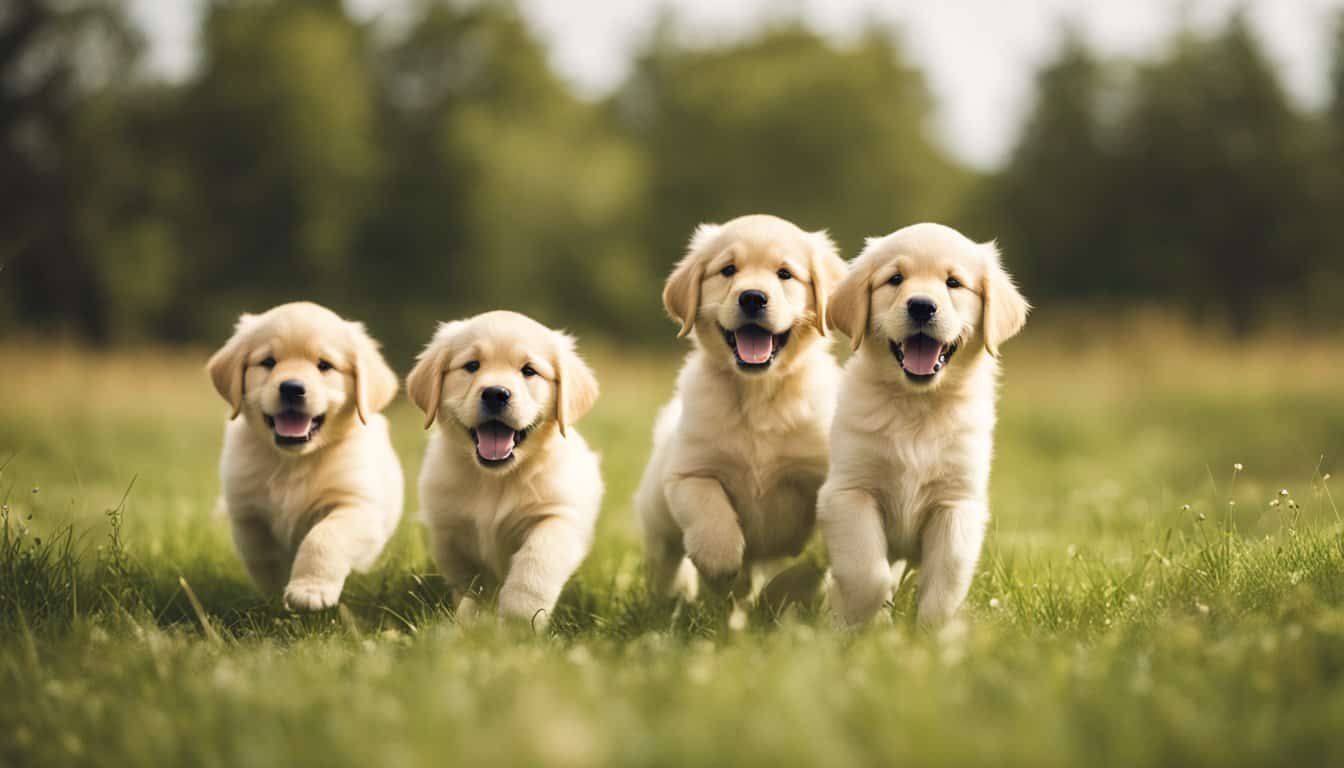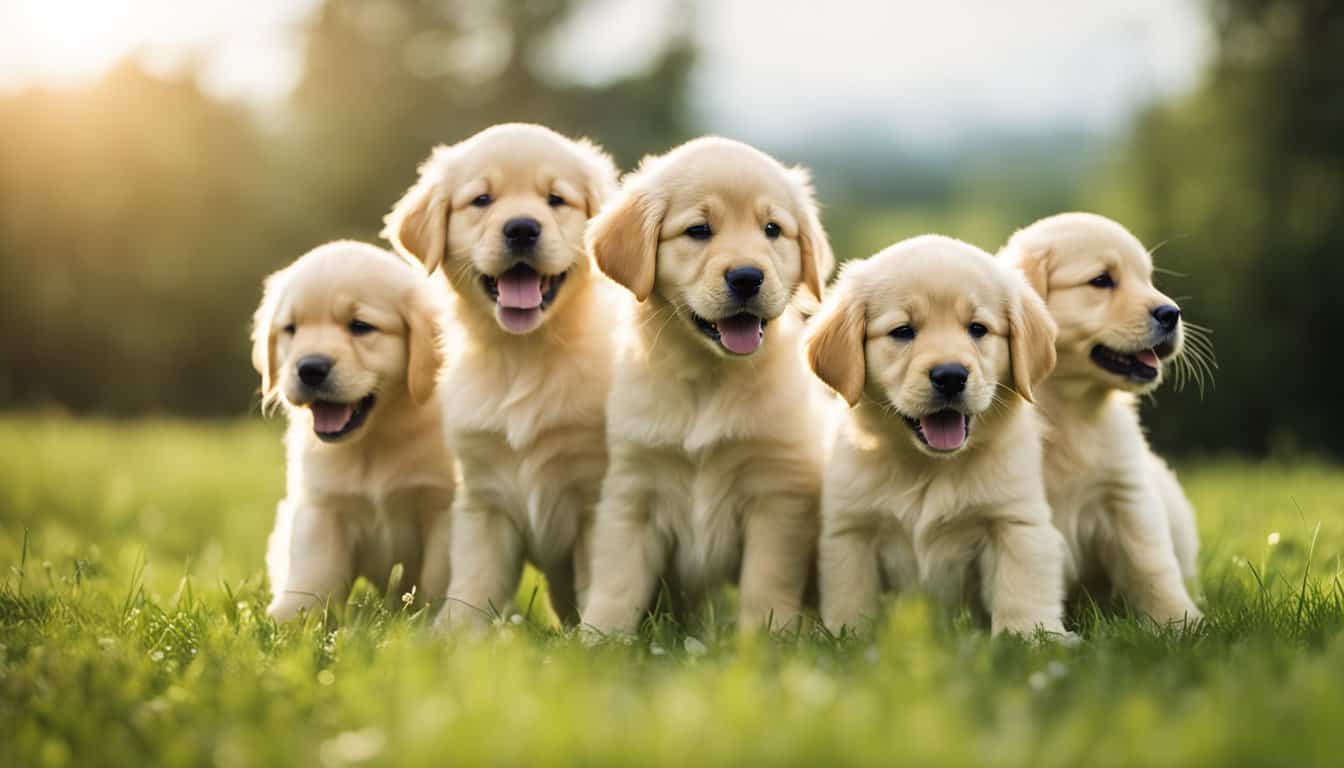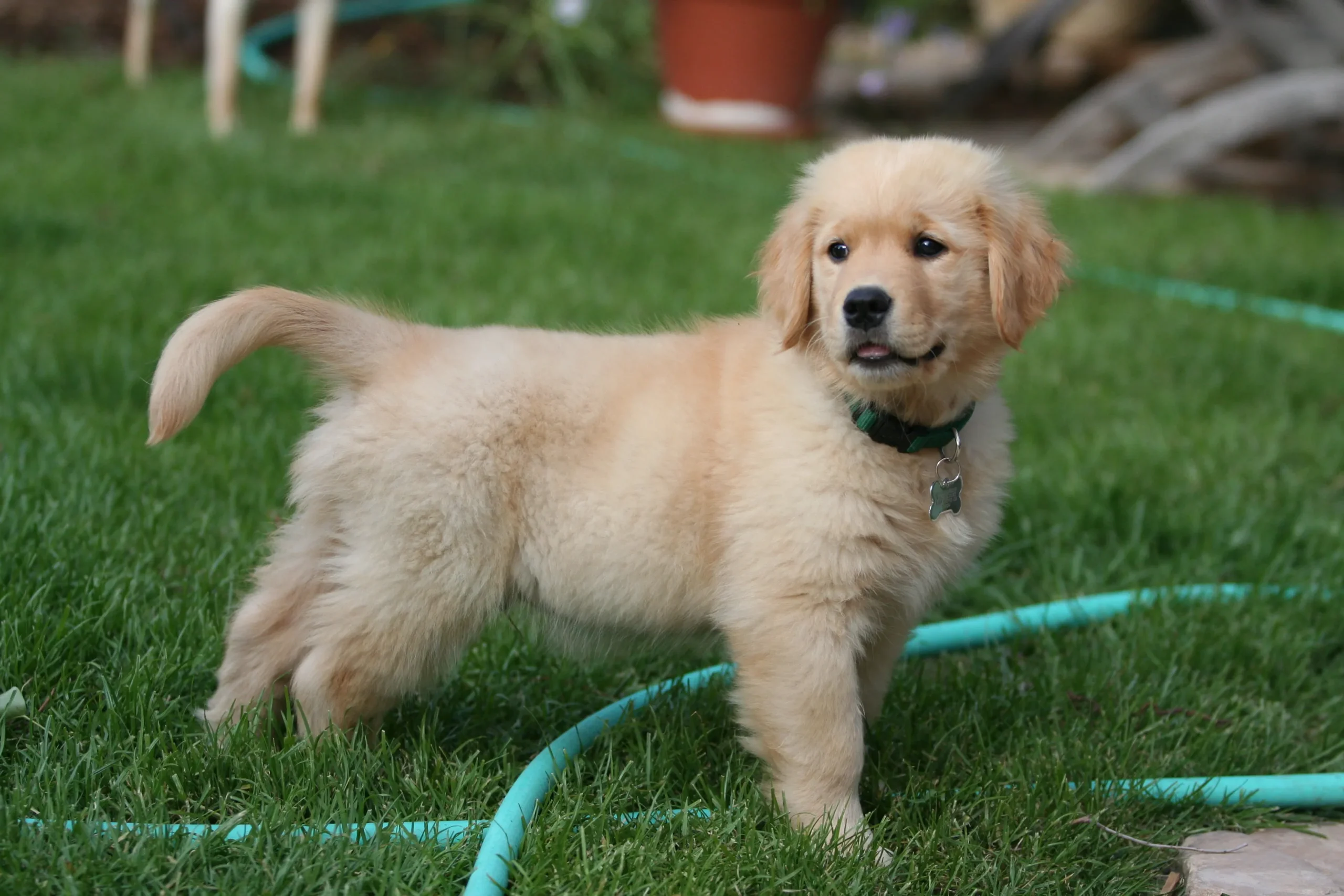Are you considering getting a golden retriever but worried about their size? Well, you’re in luck! In this article, we’ll explore whether it’s possible to find a golden retriever that stays small. Many people love the friendly and loyal nature of golden retrievers, but their large size can be a concern for some. Stay tuned to discover if there are any smaller versions of this beloved breed that might be a better fit for your lifestyle.
If you’re looking for a smaller dog that still possesses the wonderful traits of a golden retriever, you may be wondering if such a thing exists. While golden retrievers are typically known for their medium to large size, there are some variations that tend to be smaller. In this article, we’ll delve into the different factors that can influence a golden retriever’s size and explore whether it’s possible to find a golden retriever that stays small. So, if you’re interested in welcoming a smaller version of this beloved breed into your home, keep reading to find out more.
What is a Golden Retriever?
If you’re considering getting a golden retriever or already own one, it’s important to understand their characteristics and needs. Golden retrievers are a popular breed known for their friendly and gentle nature. They are medium to large-sized dogs with a beautiful golden coat that gives them their name.
A Friendly and Intelligent Breed
One of the key traits that sets golden retrievers apart is their friendly and sociable nature. They are known for being great family pets, as they get along well with children and other animals. Their intelligence and eagerness to please make them highly trainable, which is why they excel in various roles such as therapy dogs, search and rescue, and assistance work.
Active and Energetic
Golden retrievers are active dogs that require regular exercise to keep them happy and healthy. They love being outdoors and enjoy activities like long walks, playing fetch, or swimming. A lack of physical activity can lead to boredom and potentially result in destructive behavior, so it’s important to provide them with plenty of opportunities to burn off energy.
Grooming Needs
With their long and dense double coat, golden retrievers have moderate grooming needs. Regular brushing is necessary to prevent mats and keep their coat healthy. Additionally, they tend to shed quite a bit, especially during seasonal changes, so frequent brushing can help keep the hair under control. Occasional bathing and routine ear cleaning are also important for overall hygiene.
Health Considerations
Golden retrievers are generally healthy dogs. However, like any breed, they may be prone to certain health conditions, such as hip dysplasia, elbow dysplasia, and certain types of cancer. Regular veterinary check-ups, a balanced diet, and proper exercise can help minimize the risk of these conditions.
Understanding what makes a golden retriever unique will help you provide the best care for your furry friend. Whether you already have a golden retriever or are considering getting one, knowing these fundamental aspects of the breed will ensure a fulfilling and happy companionship.
So, now that you have a better idea of what a golden retriever is all about, let’s delve into the possibility of finding a smaller version.
The Average Size of a Golden Retriever
As a dog lover and owner of both a golden retriever and a Goldendoodle, you may have noticed that these breeds can vary in size. When it comes to golden retrievers, their average size can range from medium to large. However, there are a few factors that can influence the size of a golden retriever. Let’s explore them further.
1. Genetics: Just like humans, dogs inherit certain traits from their parents. The size of a golden retriever is primarily determined by their genes. If both of the parents are on the larger side, it’s likely that the puppies will also grow to be larger. On the other hand, if the parents are smaller, there’s a higher chance of the puppies being smaller in size.
2. Nutrition: Proper nutrition is key in ensuring a golden retriever reaches their full potential in terms of size. Providing a balanced and nutritious diet from puppyhood to adulthood can help support their healthy growth and maintain an optimal weight. It’s important to consult with your veterinarian to determine the right feeding plan for your golden retriever.
3. Exercise: Regular exercise is essential for the overall well-being of a golden retriever. Engaging in physical activities helps them burn calories, build muscle, and maintain a healthy weight. While exercise does not directly impact their size, it does contribute to their overall body composition.
4. Gender: Generally, male golden retrievers tend to be larger than females. This is a natural biological difference between the sexes. However, keep in mind that individual variances can still occur within each gender.

« Discover the Ultimate Guide to Adopting Retired Golden Retrievers in Victoria – Uncover the Secrets to a Successful Adoption Process
Discover the Surprising Reasons Behind Golden Retrievers’ Walking Troubles – You Wouldn’t Believe 4 »
5. Breeding: If you are specifically looking for a golden retriever on the smaller side, it’s worth considering specialized breeding programs. There are breeders who focus on producing golden retrievers with smaller frames. However, it’s crucial to research and ensure that these breeders prioritize the health and well-being of the dogs.
Remember, every dog is unique, and individual variations in size can occur even within the same litter. While it is possible to find a golden retriever that stays smaller, it’s important to focus on providing proper care, nutrition, exercise, and love to your furry friend, regardless of their size. That way, you can ensure they live a happy and healthy life.
Small-sized Golden Retrievers: Fact or Myth?
As a dog lover and owner of a golden retriever and a Goldendoodle, you may find yourself wondering if it’s possible to get a golden retriever that stays small. Well, let’s dive into this topic and explore whether small-sized golden retrievers are a fact or just a myth.
First and foremost, it’s important to understand that golden retrievers are typically a medium to large breed. They are known for their majestic appearance and friendly, gentle nature. However, like with any other breed, there can be variations in size within the golden retriever breed.
Genetics play a significant role in determining a dog’s size. A golden retriever’s size is largely influenced by their lineage. If both parents are on the smaller side, there is a higher chance of the offspring being smaller as well. However, keep in mind that genetics can be unpredictable, and there’s always a possibility of having some variation in size within a litter.
Nutrition also plays a vital role in a dog’s growth and development. Providing a balanced and appropriate diet is crucial in ensuring a golden retriever reaches their full potential size. Consult with your veterinarian for guidance on the best nutrition plan for your dog, as overfeeding or underfeeding can lead to unhealthy weight gain or stunting of growth.
Exercise and activity levels can also impact a dog’s size. Regular exercise keeps a golden retriever fit and helps maintain a healthy weight. However, excessive or inappropriate exercise before a dog’s growth plates have closed can potentially stunt their growth. It’s important to strike a balance and provide adequate exercise that supports their overall well-being.
While there are specialized breeding programs that focus on producing smaller golden retrievers, it’s essential to remember that the breed standard for golden retrievers does not include a specific size requirement. Consequently, finding a small-sized golden retriever that meets the breed standard may be challenging.
While small-sized golden retrievers do exist, they are not as common as their larger counterparts. Remember, the size of your golden retriever or Goldendoodle does not determine their worth or the love they can bring into your life. Regardless of their size, all dogs deserve proper care, nutrition, exercise, and, most importantly, your unwavering love and affection.
Factors Affecting the Size of a Golden Retriever
As a dog lover and owner of a golden retriever and a Goldendoodle, you may wonder if it’s possible to get a golden retriever that stays small. The size of a golden retriever can depend on various factors, including genetics, nutrition, exercise, and gender.

Genetics: The size of a golden retriever is largely influenced by its genetics. Just like humans inherit certain physical traits from their parents, so do dogs. If the parents of a golden retriever are on the smaller side, there’s a higher chance that their offspring will also be smaller. However, it’s important to note that genetics alone cannot guarantee a small-sized golden retriever.
Nutrition: Proper nutrition is crucial for a golden retriever’s growth and development. Feeding your dog a well-balanced diet that suits their age, size, and activity level is essential. However, it’s important not to overfeed your golden retriever in an attempt to make them stay small. Overfeeding can lead to obesity, which can have negative effects on their health.
Exercise: Regular exercise is important for maintaining a healthy weight and overall well-being. However, excessive exercise during a golden retriever’s growth phase can potentially stunt their growth. On the other hand, insufficient exercise can lead to weight gain and potential health issues. Aim for a moderate and consistent exercise routine tailored to your golden retriever’s age and size.
Gender: Gender can also play a role in the size of a golden retriever. Male golden retrievers tend to be larger and heavier than females. However, keep in mind that size variations can still occur within each gender.
While specialized breeding programs exist that focus on producing smaller golden retrievers, it’s important to approach this with caution. Such breeding practices may have potential health implications for the dog. Regardless of their size, all golden retrievers deserve proper care, nutrition, exercise, and love.

Breeding Strategies for Smaller Golden Retrievers
If you’re considering getting a golden retriever that stays small, it’s essential to understand the breeding strategies that can be utilized to achieve this outcome. Breeding smaller golden retrievers involves careful selection and genetic considerations. Here are some strategies breeders may employ:
Selective Breeding: Responsible breeders who aim to produce smaller golden retrievers will carefully choose parent dogs that have a smaller build. By selecting individuals who are naturally smaller in size, the likelihood of producing smaller offspring is increased. Keep in mind that this process can take several generations to achieve consistent results.
Crossbreeding: Another approach is crossbreeding, which involves mating a golden retriever with a smaller breed. One popular crossbreed is the Goldendoodle, which is a mix between a golden retriever and a poodle. Goldendoodles often come in different sizes, including smaller variations. Opting for a Goldendoodle can be a great way to have a smaller-golden retriever-like dog.
Limited Intentional Breeding: Some breeders may introduce intentional limitations to the number of offspring a smaller golden retriever produces in their lifetime. By doing so, breeders can help prevent any potential health issues associated with repeatedly breeding smaller-sized dogs.
While these strategies can contribute to producing smaller golden retrievers, it’s crucial to remember that genetic variation can still occur. There are no guarantees that every offspring will be smaller in size. Additionally, it’s important to consider the potential health implications that can arise from selectively breeding for smaller size. These can include joint problems, heart issues, and other health conditions.

As a responsible dog owner, it’s essential to prioritize the overall health and well-being of your furry friend over specific size preferences. Regardless of their size, golden retrievers and Goldendoodles are known for their friendly, loving nature and loyalty. Focus on providing them with a balanced diet, regular exercise, and lots of love and attention.
Remember, the size of your golden retriever doesn’t determine their worth or the amount of affection they have to offer. Embrace their unique personality and cherish the special bond you share.
Adopting a Small Golden Retriever
If you’re considering adopting a small Golden Retriever, there are a few things you should know before making a decision. As a dog lover and owner of both a Golden Retriever and a Goldendoodle, I understand the appeal of smaller breeds. However, it’s important to remember that size can vary within a breed, including Golden Retrievers.
Here are a few things to keep in mind when adopting a small Golden Retriever:
- Genetics play a role: While there are strategies like selective breeding and crossbreeding that can contribute to smaller sizes, it’s essential to remember that genetics are complex. It’s not a guarantee that every dog from these breeding strategies will be smaller. Size can also be influenced by other factors such as nutrition and exercise.
- Potential health implications: Breeding for size can sometimes come with health risks. Smaller dogs may be more prone to certain health conditions, including joint problems and respiratory issues. It’s crucial to prioritize the overall health and well-being of your furry friend rather than focusing solely on size.
- Consider mixed breeds: Another option to consider is adopting a Goldendoodle, a crossbreed between a Golden Retriever and a Poodle. Goldendoodles are often bred to be smaller than standard Golden Retrievers and can be a great choice if you’re specifically looking for a smaller dog. However, it’s important to research reputable breeders and ensure the well-being of the animals.
Remember, whether your Golden Retriever is small or standard-sized, what matters most is the love and care you provide. Cherish the special bond with your furry companion and focus on creating a happy and healthy life together. Size should never be the sole determinant of your dog’s worth or happiness.

Adopting a small Golden Retriever can be a wonderful experience. Keep in mind the genetic complexities, potential health implications, and the option of considering mixed breeds like Goldendoodles. Regardless of size, prioritize the well-being and love you share with your furry friend. Start your journey of companionship with a small Golden Retriever and create lifelong memories together.
Conclusion
In your search for a smaller golden retriever, it’s important to remember that breeding strategies can contribute to producing smaller dogs, but there are no guarantees. While selective breeding, crossbreeding, and limited intentional breeding can be options, potential health implications should be considered.
Regardless of their size, prioritizing the overall health and well-being of golden retrievers is crucial. Cherishing the special bond you share with your furry friend should always be the top priority.
If you’re specifically looking for a smaller dog, considering mixed breeds like Goldendoodles could be a great option. These adorable pups combine the traits of golden retrievers and poodles, often resulting in smaller sizes.
Ultimately, the most important thing is the love and care you provide to your dog. Size doesn’t matter when it comes to the joy and companionship they bring to your life. So, whether you have a small golden retriever or a larger one, treasure the moments and cherish the bond you share.








